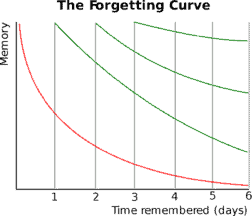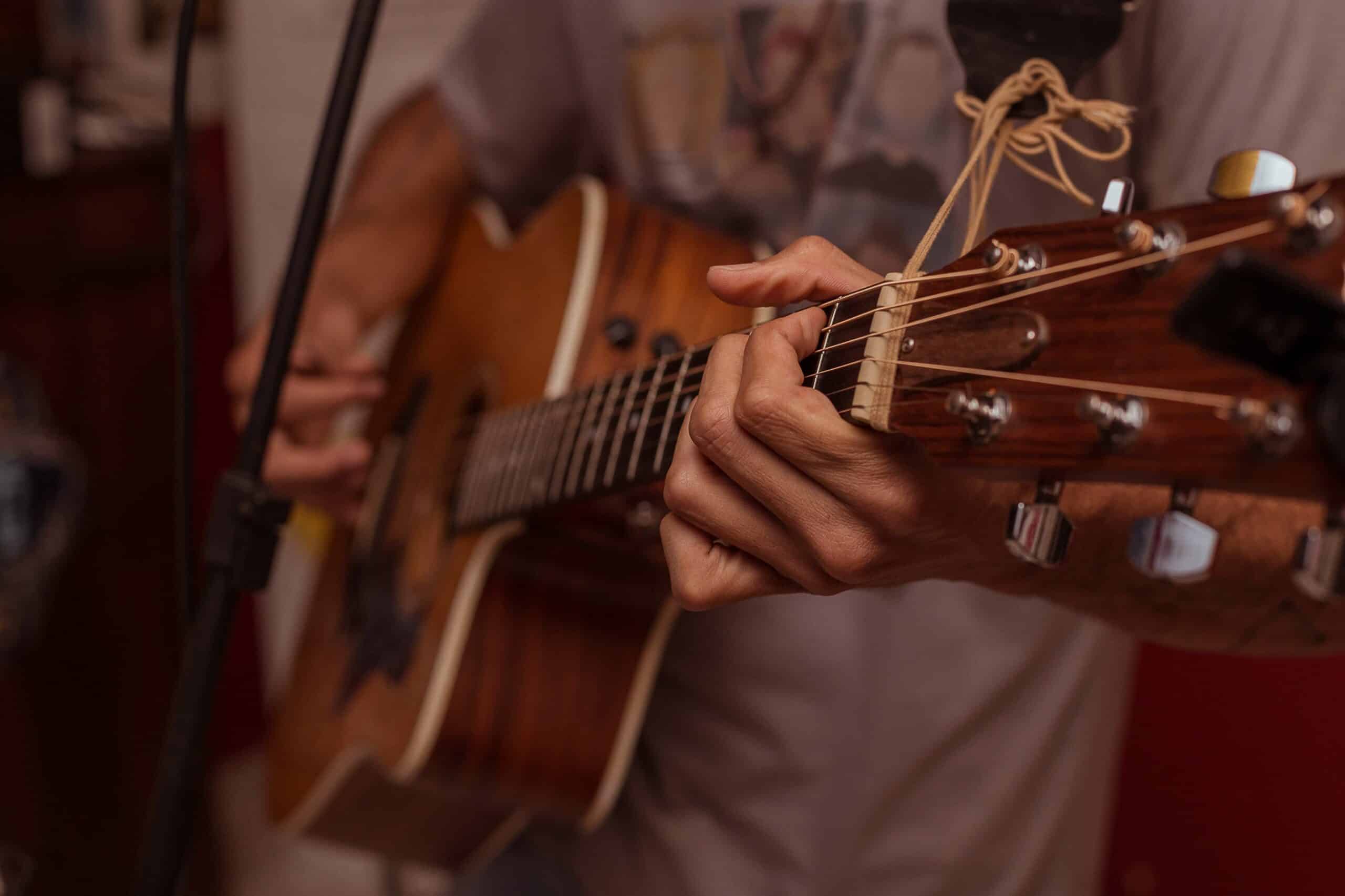Should I Be Practicing My Guitar Every Day?
To commemorate Day 3 of my 30-day coaching challenge, I'll answer a common question that beginner guitarists all tend to have - and it's a good one:
Q: Should you practice guitar every day?
I'll answer this question based off my personal experience, and what I've learned from teaching and observing students. But first I want to explain something called the Ebbinghaus Forgetting Curve.
In 1885, a psychologist called Herman Ebbinghaus published a research article detailing how quickly we forget something once we've learned it. Especially if we don't try to retain it.

Take a look at the chart above. The left vertical line shows your memory retention. The top is 100% and the bottom is 0%.
That red line is our memory when we initially learn something, say a G chord.
You can see that if you learned that and didn't come back and practice it, you'll forget almost everything you learned about it after just a few days.
Now take a look at the green lines. This is the repetition of practice. By day 3 and 4 you have it so committed to memory that it takes a long time to forget it.
That's just after a few days of practice too.
How Often Should You Practice Guitar?

The chart puts this into perspective. After 24 hours you forget most of what you learned if you don't practice it.
So if you only practice every 2 or 3 days, you have to spend a lot of time just re-learning what you already learned on day 1.
Based on this principle, and years and years of experience, it's best to practice a little each day.
Spending time each day will help you remember what you've learned. And you'll make more progress which will give you good momentum. This momentum encourages you to practice more.
At a certain point certain things will become natural. For instance, I don't have so practice many chords because I've spent so many years playing them. They're 100% natural and automatic.
But I do need to spend time practicing new things I've learned. Once those become natural and ingrained in my memory I don't have to spend as much time on them.
The way I think of it is like a pathway on a hiking trail. When you learn something you're cutting a new pathway. It takes time for those pathways to become permanent.
And if you let too much time go between practicing, those pathways degrade and you have to forge them again from almost nothing.
But with enough time and practice they become well defined trails. At that point, even if you don't use them for some time, they'll still be pretty clear trails.
How Long Should Your Practice Sessions Be?
So how long do you need to practice for?
Over the years I've found that shorter practice sessions work best for almost everyone. I prefer to practice in 25 minute segments or so.
That gives me enough time to warm up, get into a subject or two that I'm working on, and then play something fun that I know at the end.
If you're just starting out I recommend starting with 10-20 minute practice sessions. The reason for that is because you're probably at a point of information overload.
Everything about guitar is new and you can only absorb so much information and work on so many things. After about 10 or 20 minutes the amount you can retain goes down subatantially.
So it's better to spend a short amount of time working on just a few things, and coming back the next day with a fresh mind.
But by all means, you can spend a lot more time in the day in 10-20 minute sessions working on those things!
How To Have A Successful Practice Session

The most important tip I can give you is to have a deliberate, intentional practice session. This is something that if you do now, it will benefit your practice sessions years from now.
A lot of guitarists get to a certain point in their skill, and then every time they pick up their guitars they just noodle around. I'm as guilty as they come here!
This lack of intentionality with practice causes you to grow stagnant in your playing.
Deliberate and intentional practice is a way to really think about what you're working on. You approach it with a problem solving attitude. You're paying attention to the details.
The noodling approach is what I call mindless practice. You're just playing without really thinking about what you're doing.
You might think that playing something over and over, even mindlessly, will make you better at it. But that's not quite the case.
You could be forming bad technique habits, or playing something wrong without thinking about it.
That's not to say you can't just jam out! Far from it. Actually playing guitar is why we spend so much time learning and practicing it. But when it comes to practice sessions, being deliberate will give you significant benefits.
You'll make more progress in less time and you'll feel better about your playing and practicing. You'll quickly gain confidence in your ability to learn, and that confidence makes playing a whole lot more fun!
I'll leave you with one more story...
There was a period of time where I would grab my guitar and practice while watching TV. I'd just go through scales and simple exercises.
I'd justify it by telling myself I'd had a long hard day and I needed some time to rest my brain.
Looking back on this, I realized that even though I spent hours doing this, I had almost nothing to show for it. I didn't progress very much and I wasted a lot of time .
Even if I spent as little as 10 minutes deliberately working on those scales and exercises, I'd have a lot more to show for it.
How you practice is more important than how long you practice most of the time.
Before You Go...
I hope you found today's lesson/blog interesting and helpful. I'll be back tomorrow with another lesson that will help you grow in your guitar playing knowledge.
Do you find it helpful to practice a little each day? Or is there another schedule you've found helpful?
Leave me a comment below and let me know!

Thanks I am glad I am not alone in my practices time I do like your commits
Yes, I find it very beneficial to practice every day. I try for 30 minutes of uninterrupted practice. I do not think it matters if you practice at the same time each day, just get the dedicated practice in.
Thomas I appreciate wht you do in striving to help us amateur guitarists. My problem is getting motivated. I have had Several days now where I have not practised at all so thank you for these tips
Very good advice! I don't always have an hour to devote to practice but I can usually find 10 – 15 minutes here and there. Thank you!
Great video, great challenge Tomas. I'm one of your students from Ireland. Daily practice works for me best. I get fifteen minutes in the morning doing scales before I take the kids to school and then once I get home, I dive into a Real Guitar Success lesson and then I write (or try) to write some music.